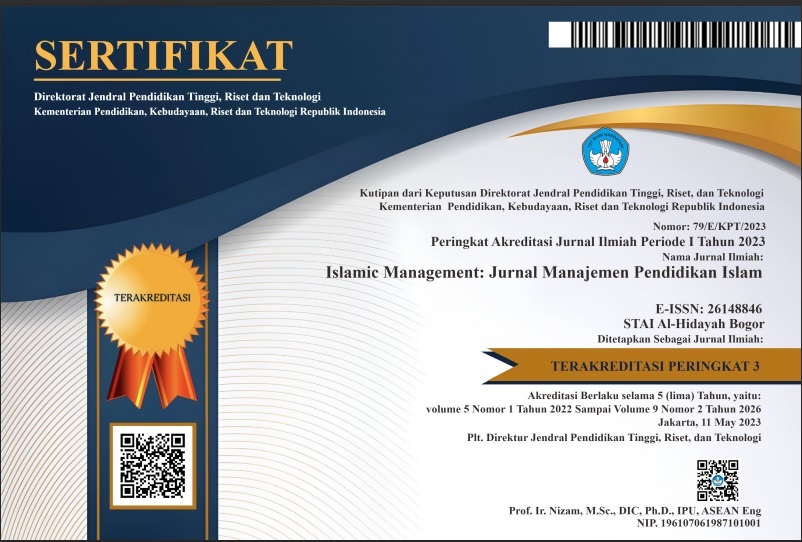ANALYSIS OF ENTREPRENEURIAL ORIENTATION ON BUSINESS PERFORMANCE WITH ABSORPTIVE CAPACITY AS AN INTERVENING VARIABLE
DOI:
https://doi.org/10.30868/im.v8i01.7951Keywords:
entrepreneurial orientation, business performance, absorptive capacityAbstract
This study aims to analyze the influence of entrepreneurial orientation on business performance of fashion MSMEs in Sukabumi with absorptive capacity as an intervening variable. Entrepreneurial orientation, which includes innovation, proactiveness and risk-taking, is believed to play a significant role in improving business performance through the ability of MSMEs to absorb, assimilate and exploit external knowledge. The study used quantitative methods with Partial Least Square (PLS) data analysis techniques. Data were collected through questionnaires involving 100 fashion MSMEs in Sukabumi. The results showed that entrepreneurial orientation has a significant positive influence on absorptive capacity (t-statistic = 28.215, p < 0.05) and business performance (t-statistic = 3.610, p < 0.05). Absorptive capacity also significantly affects business performance (t-statistic = 4.618, p < 0.05) and mediates the relationship between entrepreneurial orientation and business performance (t-statistic = 4.630, p < 0.05). The most dominant absorptive capacity dimension is exploitation, which reflects the ability of MSMEs to generate new knowledge-based innovations. The conclusion of this study is that entrepreneurial orientation supported by absorptive capacity can improve the business performance of fashion MSMEs. This research provides practical implications for MSME actors to strengthen entrepreneurial orientation and develop absorptive capacity through training and access to external knowledge.
References
Al-Hakimi, M. A., Saleh, M. H., & Borade, D. B. (2021). Entrepreneurial orientation and supply chain resilience of manufacturing SMEs in Yemen: the mediating effects of absorptive capacity and innovation. Heliyon, 7(10), e08145. https://doi.org/10.1016/j.heliyon.2021.e08145
Apriani, J., & Handoyo, S. E. (2020). Faktor-Faktor Yang Memengaruhi Kinerja Usaha Mikro Kecil Dan Menengah Bidang Fashion. Jurnal Manajerial Dan Kewirausahaan, 2(2), 439. https://doi.org/10.24912/jmk.v2i2.7937
Ato Sarsah, S., Tian, H., Dogbe, C. S. K., Bamfo, B. A., & Pomegbe, W. W. K. (2020). Effect of entrepreneurial orientation on radical innovation performance among manufacturing SMEs: the mediating role of absorptive capacity. Journal of Strategy and Management, 13(4), 551–570. https://doi.org/10.1108/JSMA-03-2020-0053
Calvin Hamel, & Andi Wijaya. (2020). Pengaruh Orientasi Kewirausahaan dan Orientasi Pasar terhadap Kinerja Usaha UKM Di Jakarta Barat. Jurnal Manajerial Dan Kewirausahaan, II(4), 863.
Daniella, C. (2023). Pengaruh orientasi kewirausahaan, orientasi pasar dan inovasi terhadap kinerja umkm bidang fashion. 05(04), 882–890.
Dewanti, I. S. (2022). Kemampuan Absorptif Sebagai Variabel Mediasi pada Pengaruh Orientasi Kewirausahaan Terhadap Keunggulan Kompetitif. Paradigma: Jurnal Masalah Sosial, Politik, Dan Kebijakan, 26(1), 22. https://doi.org/10.31315/paradigma.v26i1.6610
Ferdiansyah, A., & Bukhari, E. (2021). Pengaruh Modal, Financial Knowledge, Teknologi Dan Media Sosial Terhadap Kinerja Umkm Fashion Di Bekasi Utara. Jurnal Ilmiah Akuntansi Dan Manajemen (JIAM), 17(2), 103–114.
Indah Yuni Astuti, M. M. (2022). Astuti and Munir/ JOURNAL OF MANAGEMENT Small and Medium Entreprises (SME’s), Vol 15, No. 2, July 2022, p249-269. 15(2), 249–269.
Kale, E., Aknar, A., & Başar, Ö. (2019). Absorptive capacity and firm performance: The mediating role of strategic agility. International Journal of Hospitality Management, 78(January), 276–283. https://doi.org/10.1016/j.ijhm.2018.09.010
Layoo, N., & Rahman, W. (2019). Pengaruh Orientasi Kewirausahaan Dengan Kinerja Usaha Mikro Kecil Di Kabupaten Banggai. Jurnal Ekonomi Pendidikan Dan Kewirausahaan, 7(1), 29. https://doi.org/10.26740/jepk.v7n1.p29-44
Lorensa, E., & Hidayah, N. (2022). Pengaruh Inovasi Produk, Orientasi Pasar dan Media Sosial terhadap Kinerja UMKM Fashion. Jurnal Manajerial Dan Kewirausahaan, 4(3), 739–748. https://doi.org/10.24912/jmk.v4i3.19768
Purwanti, Y., & Chasanah, A. N. (2022). Analisis Motivasi Pelajar Indonesia Melanjutkan Studi di Jepang dengan Structural Equational Modeling Partial Least Square. Salus Cultura: Jurnal Pembangunan Manusia Dan Kebudayaan, 2(2), 114–123.
W, Z., & Ie, M. (2023). Peran Orientasi Pasar Dan Orientasi Kewirausahaan Dalam Memprediksi Kinerja Dengan Dimediasi Kapasitas Absorptif. Jurnal Muara Ilmu Ekonomi Dan Bisnis, 7(1), 161–175. https://doi.org/10.24912/jmieb.v7i1.23228
Downloads
Published
How to Cite
Issue
Section
Citation Check
License
Copyright (c) 2025 Laraswati Kambali, R Deni Muhammad Danial, Asep Muhamad Ramdan

This work is licensed under a Creative Commons Attribution-ShareAlike 4.0 International License.
Authors who publish with this journal agree to the following terms:
- Authors retain copyright and grant the journal right of first publication with the work simultaneously licensed under a Creative Commons Attribution License that allows others to share the work with an acknowledgment of the work's authorship and initial publication in this journal.
- Authors are able to enter into separate, additional contractual arrangements for the non-exclusive distribution of the journal's published version of the work (e.g., post it to an institutional repository or publish it in a book), with an acknowledgment of its initial publication in this journal.
- Authors are permitted and encouraged to post their work online (e.g., in institutional repositories or on their website) prior to and during the submission process, as it can lead to productive exchanges, as well as earlier and greater citation of published work (See The Effect of Open Access).






